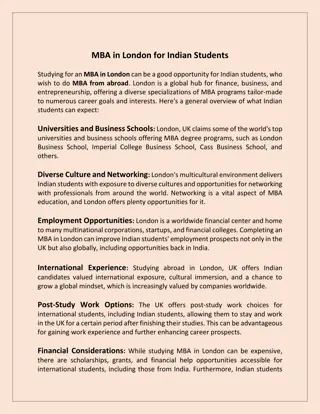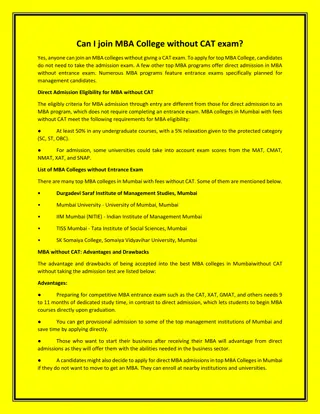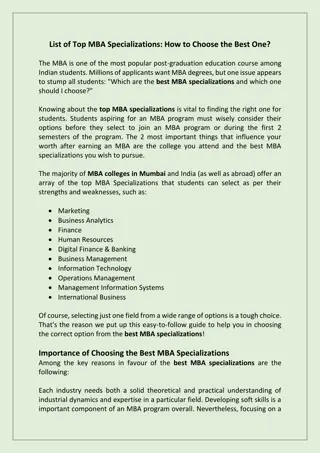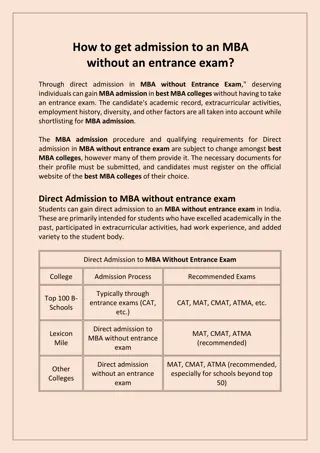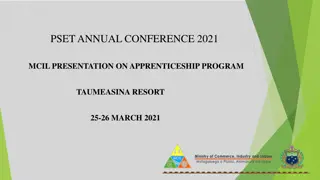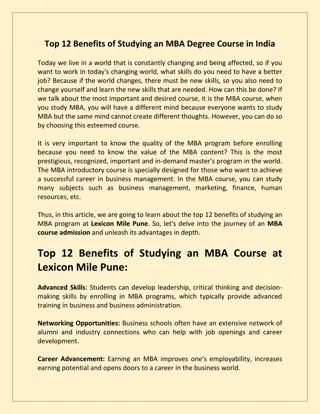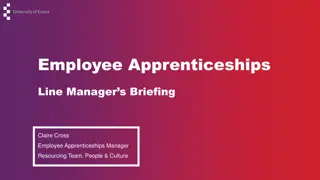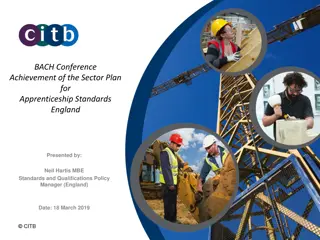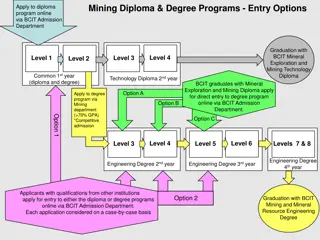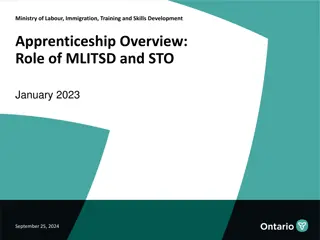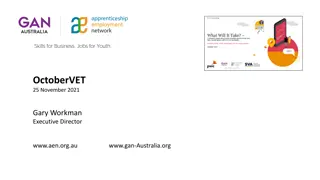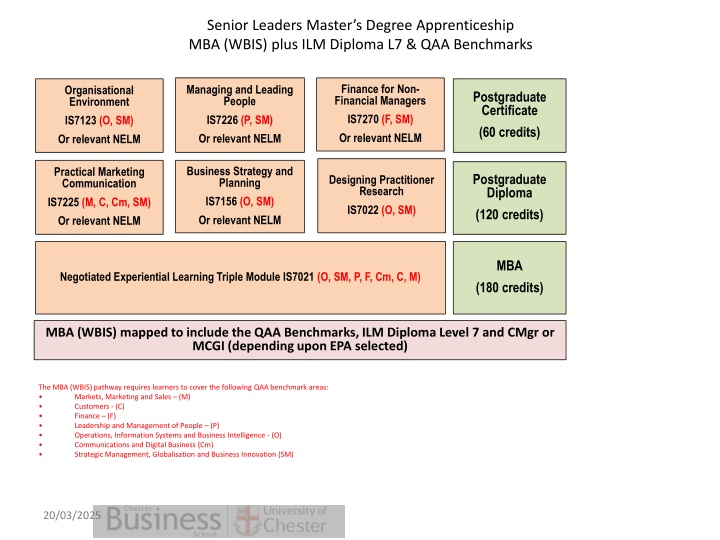
Organisational Environment and People Management
Explore the intricate dynamics of organisational environments and the vital role of managing and leading people within organizations. Gain insights into factors influencing organizations and best practices in leadership and management for optimal performance.
Download Presentation

Please find below an Image/Link to download the presentation.
The content on the website is provided AS IS for your information and personal use only. It may not be sold, licensed, or shared on other websites without obtaining consent from the author. If you encounter any issues during the download, it is possible that the publisher has removed the file from their server.
You are allowed to download the files provided on this website for personal or commercial use, subject to the condition that they are used lawfully. All files are the property of their respective owners.
The content on the website is provided AS IS for your information and personal use only. It may not be sold, licensed, or shared on other websites without obtaining consent from the author.
E N D
Presentation Transcript
Senior Leaders Masters Degree Apprenticeship MBA (WBIS) plus ILM Diploma L7 & QAA Benchmarks Finance for Non- Financial Managers IS7270 (F, SM) Or relevant NELM Managing and Leading People IS7226 (P, SM) Or relevant NELM Organisational Environment IS7123 (O, SM) Or relevant NELM Postgraduate Certificate (60 credits) Business Strategy and Planning IS7156 (O, SM) Or relevant NELM Practical Marketing Communication IS7225 (M, C, Cm, SM) Or relevant NELM Postgraduate Diploma (120 credits) Designing Practitioner Research IS7022 (O, SM) MBA Negotiated Experiential Learning Triple Module IS7021 (O, SM, P, F, Cm, C, M) (180 credits) MBA (WBIS) mapped to include the QAA Benchmarks, ILM Diploma Level 7 and CMgr or MCGI (depending upon EPA selected) The MBA (WBIS) pathway requires learners to cover the following QAA benchmark areas: Markets, Marketing and Sales (M) Customers - (C) Finance (F) Leadership and Management of People (P) Operations, Information Systems and Business Intelligence - (O) Communications and Digital Business (Cm) Strategic Management, Globalisation and Business Innovation (SM) 20/03/2025
Organisational Environment Whether it is a financial institution, a multi-national chemical manufacturer, the National Health Service or a University, no organisation exists within a vacuum. All are likely to be subject to government regulation, the national and local economy, some will have competitors. These factors all constitute what is known as the organisational environment (some refer to it as the business, or even corporate environment). This environment comprises of an array of factors that act upon and influence organisations and the way it works. The purpose of this module is to help you develop the appropriate skills and understanding so you may review your own organisation by scanning and interpreting its environment and drawing conclusions about the major issues it faces in the immediate future. The module is intended primarily for people working in organisations who have managerial or leadership responsibilities, who aspire to this type of role or for participants who wish to extend their knowledge of these critical factors.
Managing and Leading People Effective performance is unlikely to take place by chance and as such a crucial factor in getting the best out of people will depend upon how well they are managed and led. To this end, this module is designed to support your development and understanding of concepts concerning the functions, and purpose of management and leadership including staff motivation, management roles and approaches, leadership styles, performance management and areas of Human Resource Management such as recruitment and selection. The module is intended primarily for people working in organisations who have responsibility for managing and or leading others, those who aspire to this type of role or for participants who wish to extend their knowledge of management and leadership.
Finance for Non-Finance Managers In this module you will learn: Analysis and interpretation of financial statements Operating and capital budgeting techniques and their use in planning and control; cash flow forecast, profit versus cash Aspects related to organisational finance including product, service costing, absorption costing, overhead allocation, apportionment and absorption The underlying principles and concepts of finance and accounting The ability to read and interpret simple financial statements An introduction to the process of using structured financial data to assist in the process of management decision making.
Practical Marketing Communication (MBA Pathway only) This module is designed for business professionals who need to understand the principles of marketing communications but haven t formally studied the subject or have limited knowledge of the topic. It aims to provide attendees with a practical overview of the main aspects of marketing communications (including the use of digital tools) to help an organisation acquire, convert and retain customers. Key topics covered include: The role and function of marketing within an organisation Market segmentation and brand positioning The key factors that influence customer behaviour Marketing planning How to apply and adapt the marketing mix (including the use of digital communication tools such as search engine marketing, mobile marketing, social media, etc.) Low budget marketing campaigns Action planning and evaluating marketing campaigns.
Business Strategy and Planning (MBA Pathway only) The module is designed to provide an insight into key issues in the principles and application of business strategy and planning techniques so that the learner is able to improve their personal performance and their contribution to ongoing operations, and to continuous business improvement and innovation, typically in a public service or business environment. It includes: Why do we need business strategy and planning? Models for strategy development commercial and public sector perspectives Identifying business planning issues environment, stakeholders, organisational capability Developing a framework of aims and objectives Formulating and appraising proposals Specifying a performance management system Performance measurement and the balanced scorecard Engaging with bidding processes and stakeholders.
Designing Practitioner Research Taking a research approach to influencing change An interactive, thought provoking module where you learn practical processes to design robust and persuasive practitioner research. You will learn: Ideas that will change the way you see everything and anything How to get a strategic focus quickly and how to plan your research project How to get and keep 'the golden thread of validity' in your research A range of tools used by successful practitioner researchers How research can twist and manipulate what you (supposedly) think or do - and how to avoid it A practitioner research process to design a research proposal How to check you are being ethical. Plus many other useful tips to influence change within your organisation or profession.
Negotiated Experiential Learning Modules (NELMs) Getting credit for improving real work practice. These are negotiated modules that enhance your personal and professional impact at work, typically being focused on either an identifiable work based project, or other forms of hands on learning through work with a clear theme and which might cross-cut a variety of work areas. During these modules you will learn: Skills and knowledge that you decide to develop experientially, with help from a specialist tutor Specialist tools, concepts and terminology relevant to your area of work and learning How to deepen and broader your impact at work through a reflective approach How to evidence your learning, using artefacts generated from real work activities.






